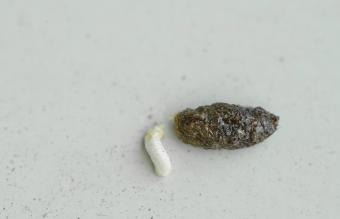What Does Reptile Feces Look Like?

If you've never had a reptile before as a pet, or aren't familiar with them in the wild, you may be wondering if lizard poop looks any different from that of mammals, birds and even insects. Or you're finding lots of unidentifiable feces in your yard or on hiking trails and want to know what creatures produced them. While the poop from snakes, turtles and lizards doesn't look too different from that of other animals, there are some differences you can use for identification purposes.
The Parts of Lizard Poop

One of the differences between lizard poop and feces from other animals is that it has two "parts" to it. There will be a small white or yellowish area on the end of the piece of feces. This is actually the lizard's urine. Lizards maintain more moisture from their urine than we do and the resulting waste is a solid or semi-solid mass of uric acid crystals. It's called a urea cap or urea smear.
This picture is poop from a gecko lizard.
Lizards Eliminate Waste From One Area

As you can see from this picture of snake feces, the two parts of a lizard's poop can be seen together because they excrete waste from the same opening of the body. Known as the cloaca, this is an area where the digestive, urinary and genital systems all empty into. This anatomical arrangement can be found in reptiles, amphibians, birds, monotreme mammals and elasmobranch fish.
Identifying Snake Feces

Snake poop can often look runny and soft because there's very little fiber in it due to a snake's carnivorous diet. When it is fresh, it will be dark in color and usually moist, but as it dries the color will lighten up to a yellowish hue often described as chalky. The dried out feces may also break apart easily.
What Do Horned Lizards Eat?

One of the interesting things about lizard poop is you can tell a lot about a particular lizard's diet by examining their feces. For example, breaking up the poop of a horned lizard reveals the remains of ants. In the wild, ants are a horned lizard's favorite meal so it follows that their poop will be full of evidence of this tasty treat. Like other lizard's poop, it also dries quickly.
Healthy Bearded Dragon Poop

Bearded dragons are a popular pet lizard and their feces looks very much like the "typical" reptile feces. A healthy-looking poop will be solid with a solid to creamy urea cap at the end. Bearded dragons can eliminate anywhere from daily to weekly with younger lizards pooping more often than older ones.
The Most Common House Lizard, Geckos, and Their Poop

Geckos can be found in homes as pets and as pests in some warmer climates. You can identify gecko poop by the urea cap and the size. If you have a home that tends to be visited by geckos, you should expect to see gecko poop that's about 1/4 inch in length and approximately 1/8 inch across.
Chameleon Poop

Chameleon poop has the same urea cap and larger feces section like other lizards commonly kept as pets. It's also generally dry and does not have a strong odor compared to poop of other common pets such as cats and dogs.
When keeping pets such as chameleons, it's important to observe their poop regularly for signs of illness, such as blood or diarrhea. You should also have the poop tested for the presence of parasites by your veterinarian.
Sign up for our newsletter featuring all the latest stories and products we love.
Skink Poop Information

Skinks are reptiles that can be found in the wild and also as family pets. Skinks can be found in 47 states although are more widespread in the Southeastern United States with the warmer climates. Skink feces can be found on decks, pathways, lawns and other areas of homes, and they are primarily attracted to eating insects. Their poop looks very similar to that of a gecko in size, shape and consistency.
What Is Tortoise Poop Like?

Like many other reptiles, a tortoise normally will eliminate every other day to every few days. The frequency of elimination depends on how active they are, the temperature and their diet and hydration levels.
Unlike a snake's feces, tortoise poop will be firmer because their diet contains much more fiber.
Facts About Tortoise Poop

In the wild, an adult tortoise can take several weeks to digest their meals. Despite eating wild plants, they actually have a beneficial effect on the ecosystem as their poop releases seeds from the plants they've eaten. Desert tortoises can also refrain from eliminating in order to retain moisture in their bodies to survive during drier climate conditions.
Now that you know more about how a reptile poops, you can understand more about how their diet, climate and other conditions can affect how their feces looks. If you have lizards as pets, or intend to, knowing more about lizard poop can aid in making sure your scaly friends are happy and healthy.







